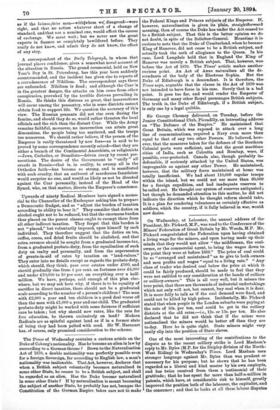Upwards of ninety Radical Members have signed a memo- rial
to the Chancellor of the Exchequer asking him to prepare a Democratic Budget, and so "adjust the burden of taxation according to ability to bear it." They consider that duties on alcohol ought not to be reduced, but that the enormous burden thus placed on the poorer classes ought to exempt them from all other indirect taxation. They forget that this burden is not "placed," but voluntarily imposed, upon himself by each individual. They therefore suggest that the duties on tea, coffee, cocoa, and dried fruits should be abolished, and that extra revenue should be sought from a graduated income-tax, from a graduated probate-duty, from the equalisation of such duty on realty and personalty, and from the supersession of grants-in-aid of rates by taxation on "land-values." They enter into no details except as regards the probate-duty, which should, they think, pass over estates under ,C500, and should gradually rise from 4 per cent. on fortunes over E4,000 and under £10,000 to 10 per cent. on everything over a half- million. We have, perhaps, said enough of this plan else- where, but we may ask here why, if there is to be equality of sacrifice in direct taxation, there should not be a graduated scale according to the number of a person's children? The man with 22,000 a year and ten children is a good deal worse off than the man with £1,000 a year and one child. The graduated probate-duty might be worked with some fairness if sufficient care be taken ; but why should new rates, like the rate for free education, be thrown exclusively on land? Modern Radicals are as spiteful against land as if in a former state of being they had been pelted with mud. Sir W. Harcourt has, of course, only promised consideration to the scheme.


































 Previous page
Previous page